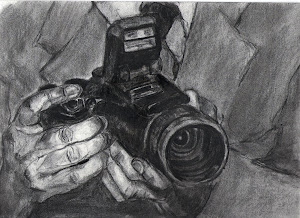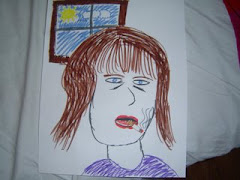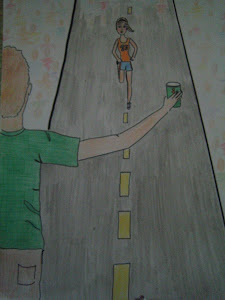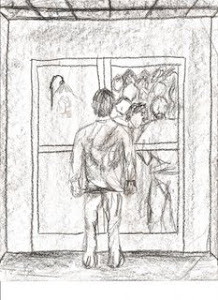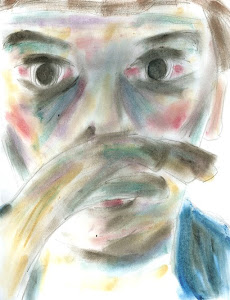
Symbolic light in van Eyck
As we look at the Annunciation, we become warmly conscious of the gentle radiance of the light, illuminating everything it embraces, from the dim upper roofing to the glancing gleam of the angel's jewels. The clarity would be too intense were it not also soft, an integrating, enveloping presence. This diffused presence, impartial in its luminescence, is also a spiritual light, surrogate of God Himself, who loves all that He has made.
The symbolism goes even deeper: the upper church is dark, and the solitary window depicts God the Father. Below though, wholly translucent, are three bright windows that remind us of the Trinity, and of how Christ is the light of the world. This holy light comes in all directions, most obviously streaming down towards the Virgin as the Holy Spirit comes to overshadow her: from this sacred shadow will arise divine brightness. Her robes swell out as if in anticipation, and she answers the angelic salutation ``Ave Gratia Plena'' (``Hail, full of grace'') with a humble ``Ecce Ancilla Domini'' (``Behold the handmaid of the Lord''). But with charming literalness, van Eyck writes her words reversed and inverted, so that the Holy Spirit can read them. The angel is all joy, all smiles, all brightness: the Virgin is pensive, amazed, unbejewelled. She knows, as the angel apparently does not, what will be the cost of her surrender to God. Her heart will be pierced with grief when her Child is crucified, and we notice that she holds up her hands in the symbolic gesture of devotion, but also as if in unconscious anticipation of a piercing.
The angel advances over the tiles of a church, where we can make out David slaying Goliath. (Goliath represents the power--ultimately fruitless--of the Devil.) The message the angel gives Mary sets her forth on her own road to the giant-slaying that is her motherhood and holiness.
Here is a link to further explanation of all the symbols in this painting. (just hit the title of this post and it will bring you there) http://leesandlin.com/reviews/97_0808.htm
Friday, December 14, 2007
Van Eyck picture and commentary
Posted by
Tmart
at
8:46 AM
0
comments
![]()
Links to the poetry of John Donne
One of the most beautiful poets expressing
that human and divine interaction. For your Christmas assignment
it may be someone to check out.
Posted by
Tmart
at
8:40 AM
0
comments
![]()
Wednesday, December 12, 2007
Great examples of Story mapping
Check out these two great examples of story mapping--one by Rosie Croghan and the other by Karon Walsh. Great job!
Posted by
Tmart
at
4:57 AM
1 comments
![]()
Labels: story mapping
Monday, December 10, 2007
Andre Dubus' "A Father's Story"
A Commentary
"So, He says, you love her more than you love Me.
I love her more than I love truth.
Then you love in weakness, He says.
As You love me, I say, and I go with an apple or carrot out to the barn."
These last lines of Andre Dubus' "A Father's Story" elevate what until the last few pages is a dramatic story illustrating the most perplexing of moral quandries (do we choose love or truth?), into an even more complex theological rumination (Why did God allow his Son to die?; What does it mean that God loves us "in weakness.") Like Thomas Aquinas's theology of grace, this story grasps the reader on two levels--the natural/ordinary (Luke's dilemma between the love of his daughter and the truth to do what is right and just), and the supernatural (Luke's ever-present perception of God becomes the God with whom Luke has an ongoing dialogue by the end). As in Thomas' theology, to grasp the latter of these, one must mine and prod the first (as Luke Ripley has it, "I…have come to believe my life can be seen in miniature in that struggle in the dark of morning'). This essay, thus, begins with the narrative of Luke Ripley, before proceeding to the Christological-narrative revealed in Luke's dialogue with God.
First Narrative: Luke Ripley
Much of the early part of the story, Dubus deftly details both the fractured history and emotional texture of the life of Luke Ripley. He is a divorced father of three sons and one daughter ("It is Jennifer's womanhood that renders me awkward."). His best friend is a Catholic priest with whom he talks of faith and longing ('Belief is believing in God; faith is believing that God believes in you"). We hear of why his marriage fell apart and what his reflection on it and love are now ("I believe ritual would have healed us more quickly then the repetitious talks…perhaps then we could have subordinated feeling to action, for surely that is the essence of love."). We also learn of Luke's perspective on the Church and his faith in it and God ("what I'm really doing is feeling the day, in silence, and that is what Father Paul is doing on his five-to-ten-mile walks.")
The first narrative comes to a head when his daughter Jennifer comes home following an evening out drinking and skinny dipping: "…then the sobs in her throat stopped, and she looked at me and said it, the words coming out with smoke: 'I hit somebody. With the car." Certainly one of the most dramatic moments is when Luke returns to the scene of the accident to see if the accident occurred and if the person his daughter hit is alive. With the full awareness that God is watching his actions, Luke proceeds to feel for life in the dead young man. At one point Luke compares himself to Cain (Where is your brother?) or Job (suffering without reason)--stating that he is not sure which he is closer to (murder/Cain or absurd suffering/Job). Luke then follows up in action what he knew he was going to do the first he heard of what happened: he fails to report the accident, and furthermore, covers up his daughters manslaughter through crashing the car she had used, in front of the church the next morning on the way to Mass. Some scenes between daughter and father in their collusion to cover this crime up--purposely leave the reader uneasy. Can such a secret drive them apart? How is each going to live with this?
Second Narrative: Luke's Love of His Daughter--God's Love of Christ/Mankind
The last few pages beginning with the lines: "I have said I talk with God in the mornings…" elevate this story beyond ethics (was the act he did right or wrong) to: 1) questions of the salvation of Luke's soul, and 2) questions about the nature of the Christian God and salvation understood within its tradition.
The question of whether what Luke did was right obviously has great religious repercussions for Luke. We are left asking: Did Luke's action to cover this up willingly, damage his soul irreparably? The questions of justice for the dead boy and his family and the dignity of that life that was taken by careless and negligent actions by his daughter is one question. The deeper question, however, is the cover-up and how Luke justifies it to himself and to GOD. According to Luke, it is only with God that he battles with this question (not even Father Paul knows). Such an ending is reminiscent of Abraham (Gen 22, and Gen. 18--where Abraham does God's will, even to sacrifice his child in one story, and in the other, challenges the justness of God's order), Job, and even the story of the prodigal son. The question behind it is: What is Luke's duty--to the truth and justice or to the love of his daughter? This is a profound question for us all. One perceptive student to this question said: "We can live without truth but with love, but we cannot live with truth and no love." (Nice job Pat Barrett!).
What if, however, we could do both--both love and do the truth? In this case it would have meant that Luke would have had to turn his daughter in. Luke states that if it was a SON, he could do this as the type of love between son and father mandates that the Father must let the Son be bruised and broken in life. When a father sees this--he is proud of his son. To see and allow this is what a Father's love to a son means. For a father's love for his daughter, however, to let her suffer he seems to infer that if you do not do something to stop the suffering, IT IS NOT LOVING HER. Or in the very least--Luke states--he cannot let this happen because it hurts more to a father to see his daughter suffer, then it does to see his son suffer. In either case, the question here is raised: WHAT IS LOVE? What is the role of allowing another person freedom--and not to intervene--what does this have to do with love?
The last half of a page elevates this story from the questions of Luke's salvation to the questions of the CHRISTIAN UNDERSTANDING OF GOD and the "economy of salvation" (why God became human and suffered and died for humans). This begins with the lines where God actually begins talking to Luke: "And He says: I am a Father too." Luke also speaks to God--both to God as the Father, and to God as the Son. Each line at this point has great theological meaning. The lines of God responding to Luke are the following:
"I am a Father too," "Yes, but I would not lift the cup," "Why? Do you love them less?," "So, you love her more than you love Me," and "Then you love in weakness." This profound exchange between Luke and the Trinitarian God suggests: 1) That God the father also feels for his Son as Luke does for his daughter, 2) That God loves his Son--as a Parent loves their children--allowing them to suffer through the trials of life as they cannot intercede without taking away their freedom, 3) that love manifests itself differently dependent upon the individual, i.e. love in different ways for their needs, and 4) that God--loves us "in weakness." These last lines are meant to hang with us. What does it mean "to love in weakness?"
To answer this, I think it is instructive to examine a few important scripture passages: Abraham (Gen 22), the parable of the two sons (Luke 15), and the crucifixion of Christ (all the Gospels). In comparing how God demands Abraham's obedience to prove his love with the love of the Father in the prodigal son, we can see that Jesus presents a God of unconditional love. The God Jesus reveals in the parable is one of Agape--waiting and happy without judgment for the return of the son. This seems to be the message for us…that God's love is without judgment and always present. Thus, In contrast to the God of Genesis, this could be interpreted as "loving in weakness."
The God Jesus reveals, on the Cross, however, can be looked at several ways: 1) Jesus' love for us--in his total weakness, his love is expressed most, 2) God's love for us--despite our wrong-doing, God loves us so much HE SUFFERS on our behalf so that we can find his love, 3) God-Jesus--the love of the two (Doctrine of the Trinity: God is one being, who exists simultaneously and eternally in three persons) for one another allows the other person to suffer. This very profound ending leaves with Luke responding: "As You love me"--suggesting that God will continue to love Luke despite his action. It also gives us through the analogy of Luke's own love for his daughter, a glimpse into the type of love God the Father might have for his Son, as well as by extension (since he let his own Son suffer on our behalf), for us. Likewise, it also demonstrates Jesus' (the Son's) love for the Father.
What are we to make of this for ourselves? I think there are some great questions to ponder for our own view of love and faith. What does "loving in weakness" mean for us? What does it mean to choose love over truth? What does it mean to view God's love as "loving in weakness" for our own life and faith? Such questions, of course are deeply personal. I find them, however, to be also deeply beneficial in stimulating a deeper awareness of love, responsibility, faith, and my own understanding of God.
Posted by
Tmart
at
10:00 AM
54
comments
![]()
Tuesday, November 20, 2007
Interpretive Questions
Posted by
Tmart
at
6:41 AM
0
comments
![]()
Friday, November 16, 2007
Model Classroom Blogs
I attach an interesting link for groups and individuals.
It is a class web site/project in which they created a study guide for a novel they were reading--The Secret Life of Bees...Scan down the pages and notice the pictures with text, etc.
http://weblogs.hcrhs.k12.nj.us/bees/
Posted by
Tmart
at
11:48 AM
12
comments
![]()
Tuesday, November 13, 2007
Meditation Video
For those that enjoy meditation (at least in class!)
http://www.youtube.com/watch?v=Pe4rZMGNu6A
Or this one....with music...of the boundary waters
http://www.youtube.com/watch?v=C_cieFDYqR0
Posted by
Tmart
at
5:36 AM
0
comments
![]()
Monday, November 12, 2007
Story Rounds and Blogging
By the end, we will all have read 3 stories from each of the five authors. For those authors that have more then three stories listed, you may choose as a group which ones you want to read. Here are the authors and their stories:
T.C. Boyle
Termination Dust, pp. 1-20
She Wasn't Soft, 21-42
Killing Babies, 43-65
Captured by the Indians, 66-81
Key Themes:
-self-delusion, solipsism, and evil
-social critique
-Realism
Flannery O'Connor
Good Country People, 271-291
The Enduring Chill, 357-382
Everything that Rises Must Converge, 405-420
Key Themes:
-Self delusion, sin and Christian realism
-Generational tension, etc. (see class notes)
Tim Gautreaux
Welding with Children, pp. 1-20
Misuse of Light, 21-38
Good for the Soul, 40-60
Easy Pickings, 61-78
Key Themes:
-God's pursuit of us (Hound of Heaven)
-Generational Tension; communal bonds
-Light, truth, and Grace
Raymond Carver
Bicycles, Muscles, Cigarettes, 21-31
Feathers, 332-355
A Small Good Thing, 376-405
Key Themes:
-A tough world; tenuousness of goodness
-The quiet presence of beauty and wonder
-realism
Andre Dubus
Miranda Over the Valley, 1-19
Killings, 47-64
Rose, 198-232
Key Themes:
-The beauty and fragility of love
-Human proclivity toward violence
-The possibilities and obstacles to
Personal redemption
Posted by
Tmart
at
7:36 AM
0
comments
![]()
Sunday, October 7, 2007
Poem "Entanglement"
the essence of this poem is. After you explain what you believe the essence of this poem is, identify 3 lines in the poem that are particularly potent towards offering you the meaning of this poem. PLEASE do not just say what other people have said. BE original. Also, if you are one of the later people posting, cite other students' interpretations with whom you agree with/agree with.
Entanglement (by Marion Goldstein)
"Where particles remain entangled light years apart"
I am searching
for an image
that will form itself
the way molten glass
responds to the glassblowers' breath
and becomes
the crystal container for claret
My amorphous thought
is wobbling in dark matter
an alternate universe
curled in ten dimensions
where no-thing is every-thing
blocked by light's limitation
where it doesn't matter
that there is no matter
and particles can not be detected
only known
in the wake of their effect
like God
bumping into this three dimensional universe
of spinning neutrinos
and warped time.
What magnificient symphony
of chemistry
plays itself out in the moments of belief
as if the wild field of chaos
a butterfly flaps its wings in Tokyo
and rain cascades from New York skies
possibility is infinite
they say
every action has a reaction
I think of J
her sudden death, cremation, gravesite service
finis
the one Mass card
making its way through the mail
how the family came
that cold January morning
and the stranger priest on the altar
reconstructed from the blueprint of faces
in the wooden pews
the architecture of her life
and gave her back to them
like light escaping from the black hole
of a collapsed star.
Posted by
Tmart
at
7:41 AM
52
comments
![]()
Thursday, September 20, 2007
Long Essay Questions
2) One of the main themes across the five stories we have read is that of how we view the outer world from our inner world. This theme of sight and inner/outer frequently manifests itself in the confrontation and changing of the inner world of the character with/by the reality of the outer world. Choose 3 of the five characters (Turpin, Kenneth, the Dad, Jesse, and Bub) and explore this theme--comparing and contrasting how this theme plays itself in each story. If you wrote on #5, you can only choose one of the characters you wrote on in that essay to write on in this one.
3) Choose three of the following metaphors in the following stories. Extrapolate the meaning of the metaphor within the context of the story and compare/contrast it with the other chosen metaphors/meanings. Make sure you can articulate how each of them are used within the story, as well as find some similarities with some of the other metaphors from other stories
Stories and Metaphors:
· Revelation (the Hogs)
· Kenneth: The Gun
· Chicxiclub: The Rock
· Waiting for the Evening News: The Television
Posted by
Tmart
at
9:43 AM
0
comments
![]()
SHORT ESSAY QUESTIONS
2) Compare the themes of a "Hound of Heaven" with "The Road Less Traveled"
3) Compare and contrast Lynch's notion of denial -vs- acceptance of death with Hedges' use of Freud's Thanatos -vs- Eros in his essay on war.
Posted by
Tmart
at
9:35 AM
0
comments
![]()
Friday, September 14, 2007
The Road Not Taken, by Robert Frost
After you read the poem do one of the following three in a robust paragraph. Posts that reference the poem, parts of readings, and other students' thoughts in their posts will all be considered "quality" posts. Make sure your post states up front which of the three you are responding to.
1) relate the two paths diverging in the woods, path less chosen theme to three of the following
characters: Mrs Turpin ("Revelation"), Kenneth ("The Intruder"), the Dad in Chicxulub, and Jesse McNeil ("Waiting for the Evening News"). (synthesis of story question)
2) compare the themes of this poem with the themes of "Hound of Heaven"? (poetry question)
3) compare the themes of this poem with Heidegger's Authenticity/Inauthenticity. What are the two paths--one path you are currently struggling over? (Personal divulging question).
Posted by
Tmart
at
6:03 AM
49
comments
![]()
Labels: Poetry Post
Wednesday, August 29, 2007
The Hound of Heaven
Read the Poem "The Hound of Heaven" by Francis Thompson. Link http://www2.bc.edu/~anderso/sr/ft.html
In your opinion what is the essence of this poem? Explain it as best you can in no more then 3 sentences. If others have posted prior to you and you like or dislike what they said you can add an extra sentence or two (after you have put your own "authentic" interpretation in the post. Following this cite the three lines (together, or spread out) that you found to be most revealing in giving you this interpretation...or that still remain a puzzle to you (just pose this as a question on the blog).
Posted by
Tmart
at
5:47 AM
58
comments
![]()
Labels: Poetry Response
Monday, August 20, 2007
Short Story Writers
Andre Dubus http://en.wikipedia.org/wiki/Andre_dubus

Flannery O'Connor http://en.wikipedia.org/wiki/Flannery_Oconnor

T.C. Boyle
 http://en.wikipedia.org/wiki/T.c._boyle
http://en.wikipedia.org/wiki/T.c._boyleRaymond Carver http://en.wikipedia.org/wiki/Raymond_carver


Posted by
Tmart
at
12:25 PM
0
comments
![]()






